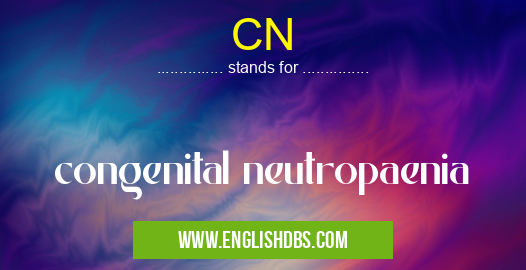What does CN mean in BRITISH MEDICINE
Congenital neutropaenia (CN) refers to a group of medical conditions that involve an abnormally low level of neutrophils, which are white blood cells that are important for helping the body fight infections. Although there are a few different types of CN, they share the same basic characteristics and symptoms. This article will explain more about the condition and its causes, signs and symptoms, diagnosis, and treatments.

CN meaning in British Medicine in Medical
CN mostly used in an acronym British Medicine in Category Medical that means congenital neutropaenia
Shorthand: CN,
Full Form: congenital neutropaenia
For more information of "congenital neutropaenia", see the section below.
What is CN?
CN is an inherited disorder of the white blood cells called neutrophils which help protect the body from infection. It can range from mild to severe in nature, depending on how much lower than normal the levels of neutrophils are. The patient’s ability to fight off infections is usually significantly compromised due to this abnormal decrease in their numbers.
In addition to being inherited, CN can also result from other causes such as certain medications or radiation therapy, but typically these cases are rare. There have been reports of CN in patients receiving chemotherapy for cancer treatment as well.
Symptoms
Patients with CN experience recurrent bacterial infections throughout their life due to their diminished immune system defenses—the absences or low levels of white blood cells make them more prone to infection including viral infections or even fungi invasions. Some common bacterial infections seen in CN patients include pneumonia, meningitis, pharyngitis (sore throat), recurrent sinusitis or ear infections caused by Staphylococcus bacteria or Streptococci bacteria respectively. Patients with congenital neutropaenia may also suffer from recurrent skin abscesses due to Staphylococcus aureus bacteria colonization on their skin.
Diagnosis
The diagnosis for congenital neutropaenia is based on a complete medical history and physical examination followed by laboratory tests such as complete blood count (CBC) or bone marrow biopsy if necessary. CBC test measures the levels of all components in your blood including red blood cells (RBCs), white blood cells (WBCs) and platelets; whereas Bone marrow biopsy looks at the concentrations of different type of stem cells present in your body particularly those related to WBCs production like granulocytes progenitors cell lines etc., A definitive diagnosis helps determine the appropriate treatment strategy for each patient/case individually based on his/her medical history and laboratory findings results.
Treatment
Depending upon severity/type of CN; physicians prescribe antibiotics such as penicillin both intravenous or oral forms depending upon symptoms & severity along with other medications such as high doses of G-CSF Granulocyte colony stimulating factor injections which helps stimulate white blood cell production by triggering bone marrow where most WBC types originate from producing new healthy WBCs within few days time helping boost up immunity power against infectious agents onslaught additionally removing some old weakened WBCs; however in case if it does not provide relief then appropriate vaccinations are recommended before getting infected.
Essential Questions and Answers on congenital neutropaenia in "MEDICAL»BRITMEDICAL"
What is congenital neutropenia?
Congenital neutropenia is a rare disorder that impairs the production of white blood cells, called neutrophils which are responsible for fighting off infection. This can result in frequent and persistent infections that can be life-threatening.
Who is most likely to be affected by congenital neutropenia?
Congenital neutropenia occurs due to genetic mutations, so it can affect people of all ages and genders who carry the mutation. It is estimated that 1 in 1,000,000 to 1 in 5 million people have this disorder.
Are there any treatments available for congenital neutropenia?
Depending on the severity of symptoms and level of risk for infection, treatment may involve increasing the amount of neutrophils through medication or regular transfusions or injections of a natural substance called granulocyte colony stimulating factor (GCSF). Sometimes additional treatments such as antibiotics are necessary to treat existing infections.
What are some long-term complications associated with congenital neutropenia?
Prolonged periods of very low or no white blood cell levels can increase the risk for developing certain types of cancer or other conditions such as osteomyelitis which is an inflammatory bone condition. As well patients may experience increased fatigue due to chronic infections. The exact long-term risks and complications vary from patient to patient.
What kind of lifestyle changes should someone with congenital neutropenia follow?
It is important to take extra care when exposed to germs such as regularly washing hands, avoiding large crowds, eating fresh foods etc as these activities could potentially lead to further serious infection. Any unusual signs or symptoms should be reported to your doctor right away.
Is it possible to prevent congenital neutropenia?
Currently, there are no known ways to prevent this condition from occurring in genetically predisposed individuals since it is an inherited disorder caused by a gene mutation; however if you have a family history you may want to discuss testing options available before pregnancy with your physician or genetic counselor.
Final Words:
Congenital neutropaenia is a rare condition characterized by abnormally decreased levels of white blood cells which have an important role inside our bodies helping us fight against any foreign invasion from viruses & bacteria equally protecting us from fungal infestations among others making it difficult for us fighting against microorganisms leading towards exposure towards potential deadly diseases hence early detection & prompt treatment have key role when it comes too treating this inherited disorder successfully allowing us too lead normal healthy lives without worrying much about getting infected & suffering terribly
CN also stands for: |
|
| All stands for CN |
